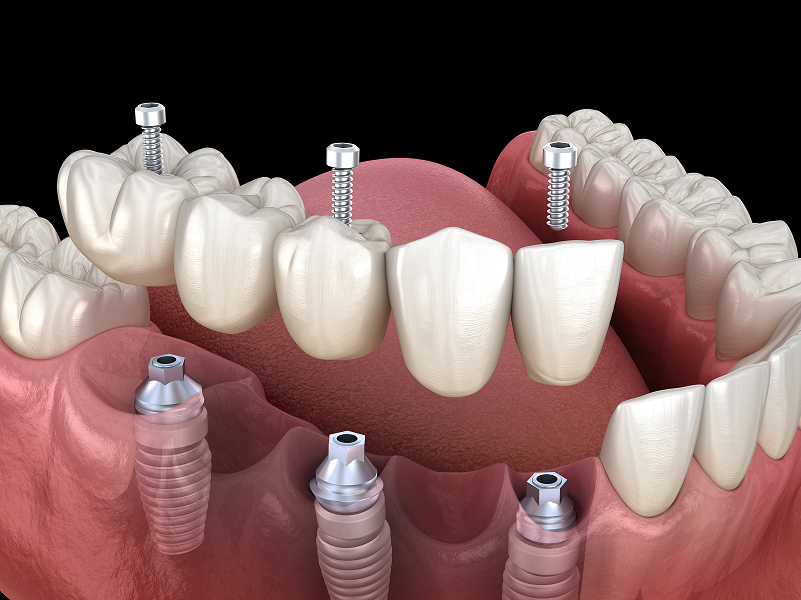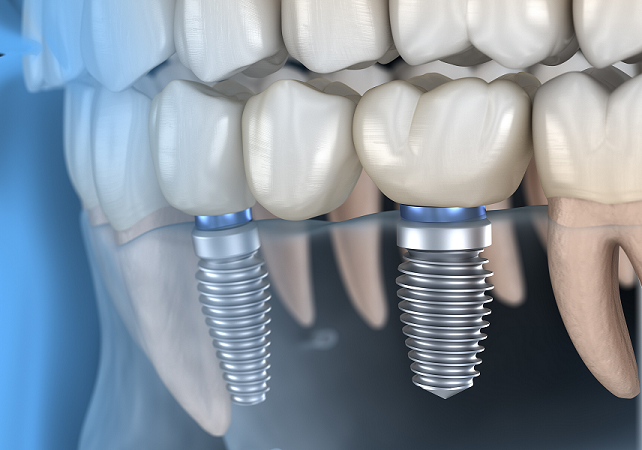Implant-Supported Bridge
Implant-Supported Bridges:
A Superior Solution for Multiple Missing Teeth
If you’re missing multiple teeth and seeking a durable, long-lasting solution that restores both function and aesthetics, an implant-supported bridge may be the perfect choice. Unlike traditional bridges, which rely on adjacent teeth for support, implant-supported bridges are anchored directly into the jawbone, offering unparalleled stability and a natural look and feel.
What Is an Implant-Supported Bridge?
An implant-supported bridge is a type of dental restoration designed to replace multiple missing teeth in a row. Instead of relying on natural teeth for support, this bridge is anchored to dental implants that are surgically placed into the jawbone. The implants act as artificial tooth roots, providing a secure foundation that prevents the bridge from shifting or loosening, ensuring optimal function and comfort.
Each implant is made of biocompatible titanium, which naturally fuses with the jawbone over time through a process called osseointegration. This creates a strong, permanent base for the bridge. The custom-designed bridge is then attached to the implants, restoring your smile’s appearance and function.

Why Choose an Implant-Supported Bridge?
An implant-supported bridge offers several key advantages over traditional tooth replacement options:
Enhanced Stability: Unlike traditional bridges or dentures that can shift or move, implant-supported bridges are securely anchored in place, providing superior stability and allowing you to eat, speak, and smile with confidence.
Preservation of Jawbone: When teeth are missing, the jawbone can begin to deteriorate over time due to lack of stimulation. Dental implants provide the necessary stimulation to the bone, preventing bone loss and preserving the natural structure of your face.
No Damage to Healthy Teeth: Traditional bridges require the adjacent healthy teeth to be filed down to support the bridge. With an implant-supported bridge, there’s no need to alter or damage your natural teeth, preserving your overall oral health.
Natural Appearance: The custom-made bridge is designed to match the color, size, and shape of your natural teeth, ensuring a seamless and natural-looking result. Your new teeth will blend in perfectly with your smile, enhancing both your appearance and self-confidence.
Long-Term Durability: Implant-supported bridges are built to last. With proper care, they can last a lifetime, making them a wise long-term investment in your oral health.
The Implant-Supported Bridge Procedure
The process of getting an implant-supported bridge typically involves several stages:
1. Initial Consultation: During your consultation, we will assess your oral health, take digital scans or X-rays, and discuss your treatment options. We’ll also determine the number of implants needed to support your bridge based on the location and number of missing teeth.
2. Implant Placement: The dental implants are surgically placed into the jawbone under local anesthesia or sedation. After the implants are placed, a healing period of several months is required to allow the implants to fully integrate with the jawbone.

3. Temporary Bridge: While your implants are healing, a temporary bridge may be placed to maintain the appearance and function of your smile.
4. Abutment Placement: Once the implants have fully integrated with the jawbone, abutments (small connector posts) are attached to the implants. These abutments will serve as the base for the permanent bridge.
5. Custom Bridge Placement: The final step involves attaching your custom-made bridge to the abutments. This bridge is designed to blend seamlessly with your natural teeth, providing a functional and aesthetic restoration.
6. Final Check-Up: After the bridge is placed, a final check-up ensures that everything is functioning correctly and that you are satisfied with your new smile.

Enjoy the Benefits of a Complete Smile
An implant-supported bridge offers a durable, natural-looking solution for replacing multiple missing teeth, restoring both the function and beauty of your smile. Whether you’re missing a few teeth in a row or need a more extensive restoration, an implant-supported bridge provides the stability, comfort, and confidence you need.
Contact us today at 302-273-8300 to schedule your consultation and learn more about how an implant-supported bridge can transform your smile and improve your quality of life.
Frequently Asked Questions
How Is an Implant-Supported Bridge Different from a Traditional Bridge?
A traditional bridge is supported by the natural teeth on either side of the gap, which often requires these healthy teeth to be filed down. In contrast, an implant-supported bridge is anchored to dental implants, which are placed in the jawbone. This method does not require altering adjacent healthy teeth and provides superior stability and support.
Who Is a Candidate for an Implant-Supported Bridge?
Ideal candidates for an implant-supported bridge are those who have multiple missing teeth in a row and sufficient jawbone density to support the implants. Patients should also be in good general health and have healthy gums. If you lack sufficient bone density, bone grafting may be necessary before placing the implants.
How Many Implants Are Needed to Support a Bridge?
The number of implants required depends on the size of the bridge and the number of teeth being replaced. Typically, two implants can support a three-to-four tooth bridge, but this may vary based on individual circumstances. Your dentist or oral surgeon will determine the appropriate number during your consultation.
How Long Does It Take to Get an Implant-Supported Bridge?
The process usually takes several months, as it involves multiple stages: implant placement, healing and osseointegration (which can take several months), and finally, the placement of the abutment and bridge. The exact timeline varies depending on the patient’s healing process and specific treatment plan.
Is the Implant-Supported Bridge Procedure Painful?
The implant placement is typically done under local anesthesia, so you should not feel pain during the procedure. Some post-operative discomfort, swelling, and bruising are normal but can usually be managed with over-the-counter pain relievers. These symptoms typically subside within a few days.
What Are the Advantages of an Implant-Supported Bridge Over a Removable Denture?
An implant-supported bridge offers superior stability, comfort, and functionality compared to removable dentures. It does not slip or move, allowing you to eat, speak, and smile with confidence. Additionally, it helps prevent bone loss in the jaw, which is a common issue with removable dentures.
How Do I Care for an Implant-Supported Bridge?
Caring for an implant-supported bridge is similar to caring for natural teeth. Regular brushing, flossing, and routine dental check-ups are essential to maintain the health of your implants and surrounding gum tissue. Special floss or interdental brushes may be recommended to clean around the implants and bridge effectively.
How Long Does an Implant-Supported Bridge Last?
With proper care and maintenance, an implant-supported bridge can last many years, often decades. The implants themselves are designed to be a permanent solution, while the bridge may need replacement due to normal wear over time.
What Are the Risks Associated with an Implant-Supported Bridge?
While the success rate for implant-supported bridges is high, potential risks include infection, implant failure, or issues with the bridge fit. These risks are minimized by choosing a qualified dental professional and following proper aftercare instructions.
Will My Insurance Cover an Implant-Supported Bridge?
Coverage for implant-supported bridges varies depending on your dental insurance plan. Some plans may cover part of the cost, especially if it’s considered medically necessary. It’s important to check with your insurance provider to understand your coverage and out-of-pocket costs.
Can an Implant-Supported Bridge Replace Front Teeth?
Yes, an implant-supported bridge can be used to replace front teeth. The custom-made bridge will be designed to match the size, shape, and color of your natural teeth, ensuring a natural-looking and aesthetically pleasing result.
